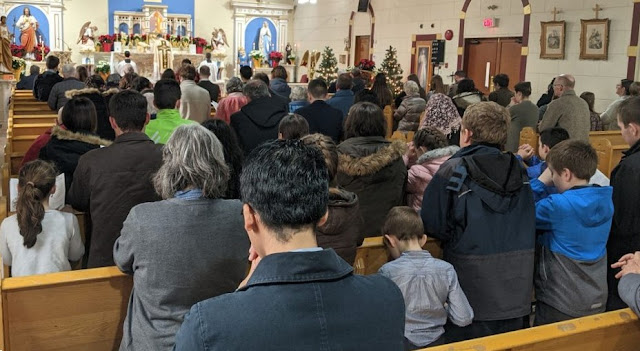Divine Worship: Return To Centre
People are drawn to a centre, the Mass, because Jesus, present in the Eucharistic Liturgy, is the heart of the community. Christ's Mass is the heart and centre of the Catholic Christian community. That fellowship nurtured during Mass extends into daily life. The Mass informs our lives and impels us to extend to others the invitation to "come and see" and be "eucharisted", grafted to Jesus and received into His fellowship, His Church. When we honour the Lord in the liturgical assembly, in the Eucharistic liturgy, through our humble acts that are born of the grace Jesus gives to us to celebrate His glory and announce His saving word, He showers His blessings upon us according to his will, for the salvation of souls.
The genius of the Ordinariate established by the Apostolic Constitution Anglicanorum Coetibus, the vessel of the Anglican patrimony, is a liturgical spiritual patrimony that sustains a generous cultural patrimony, a complex yet accessible family of complementary experiences identified, unified and informed by faithfulness to the Apostolic Tradition.
The English patrimony might be defined as the communal relationship of a people to (and in) the Sacred Liturgy and in the shared prayer of the Office, finding expression in the hospitality of fellowship following - and flowing from - the Mass.
Perhaps we might view the Patrimony as a movement of the Holy Ghost throughout history, shaping a particular people, the English people, in and through the Mass, the Office, communal devotions and the fellowship that flows from the Holy Eucharist.
Of the liturgical patrimony, Fr. James Bradley has said that
(t)he “ingredients”, we might say, have been weighed and measured into something which is altogether “new”, and yet instantly recognizable as an authentic expression both of the Roman Rite and the Anglican liturgical patrimony.
With this in mind we might conclude with two simple points. First, the preservation of the Anglican liturgical patrimony within the Catholic Church is definitively achieved in the texts of Divine Worship. To be sure, other means of expressing this may be found within the life of the ordinariates and, as we have said, this discernment is not over—how can it be? However, it is the liturgical books of Divine Worship that must now be considered the principal, and even essential means of transmitting the Anglican liturgical patrimony in the Catholic Church, both for the faithful of the personal ordinariates and as a treasure to be shared. This is an explicit expectation of the apostolic constitution and, as we have demonstrated, a constitutive element of the vision expressed therein.
Secondly, with the advent of Divine Worship the communities of the personal ordinariates need no longer consider their experience as Anglicans as the sole measure of their liturgical life—constantly referring back to what was done on the other side of the Tiber. Rather, whilst always keeping that rich history in mind, we now find in the promulgated books of Divine Worship the authentic expression of the juridical, ecclesiological, and spiritual life of the personal ordinariates, refined and presented anew by the Church, for the edification of all. Thus it is this “codified” Anglican patrimony, and not the subjective experience or individual expectation, upon which the merit and worth of each endeavour within the life of the personal ordinariates may now be measured.
Mission
God engages individuals and communities whom He calls out (1 Peter 2:9) from societies to reach further outward to the periphery of the human community. God engaged the Romans to cast a very large net. God enlisted a people that had persecuted the Church. Like Saul-become-Paul, Rome was converted and baptized to serve a global population. Could God be enlisting communities of the Ordinariates, as models of authentic ecumenism, to lead the outward reach for the salvation of souls?
God engages individuals and communities whom He calls out (1 Peter 2:9) from societies to reach further outward to the periphery of the human community. God engaged the Romans to cast a very large net. God enlisted a people that had persecuted the Church. Like Saul-become-Paul, Rome was converted and baptized to serve a global population. Could God be enlisting communities of the Ordinariates, as models of authentic ecumenism, to lead the outward reach for the salvation of souls?
Our encounter with the Risen Saviour in the Holy Sacrifice of the Mass moves us outward from the centre to draw others to the centre, to Jesus. We, the baptized into Christ, receive Jesus by eating His divine Flesh and drinking his Precious Blood, and thus we are eucharisted. Jesus lives in us! How can we remain static, isolated, and content in our warm pews, when we carry such hope within us?





.png)

Comments
Post a Comment
Your comments will be appreciated and posted if 1) they are on topic and 2) preserve decorum.
Stand by your word.